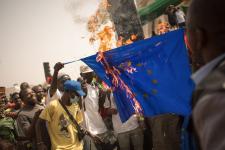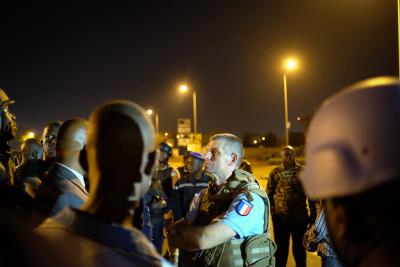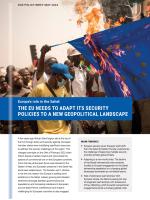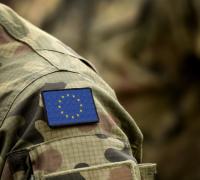Europe's role in the Sahel

- Europe’s security pivot: Europe’s swift shift from the Sahel to Eastern Europe underscores the challenge of balancing multiple security priorities amidst global threats.
- Adapting to a new world order: The decline of the liberal international order presents hurdles to Europe’s engagement in the Sahel, demanding adaptation to a changing global landscape dominated by non-liberal actors.
- Rise of alternative partnerships: With Europe’s retreat, the Sahel is seeing the rise of pragmatic partnerships with Russia and China, reflecting a shift towards transactional engagements amid a changing global order.
A few years ago Africa’s Sahel region sat at the top of the EU’s foreign policy and security agenda. European member states were mobilising significant resources to address the security challenges of the region. This changed overnight on the 24th of February 2022 when Putin’s Russia invaded Ukraine and resurrected the spectre of conventional war on the European continent.
From that day all Europe’s focus was directed to the Eastern threat, and European presence in the Sahel has since been scaled down. The Russian war in Ukraine is not the only reason why Europe is scaling down ambitions in the Sahel. Indeed, growing anti-Western sentiment amongst Sahelian governments and populations, and increasing resistance to European, and not least French, interference have made it challenging for European countries to stay engaged in the region.
The Ukraine War and the European re-focus eastwards is symptomatic of the changing global order, which tells a broader story of European–African relations in crisis. The world is changing – and European governments are struggling to decide how to position themselves within it. In the short term Europe emerges as the primary loser due to its limited readiness to navigate this evolving landscape.
A Western liberal order – and its decline
The liberal international order (LIO) is how many identify the contemporary international system since the end of the two world wars. It consists of liberal democratic states, is governed by the rule of law and multilateral institutions, and is based on (Western) norms of free trade, human rights and democracy, organised through multilateral cooperation. With the end of the Cold War, the great rival to liberal internationalism fell away, and this Western liberal order became globalised. Today, it is in crisis. The unipolar moment – when the United States dominated world economic and military rankings – is ending, wars and crises increasingly characterise the European neighbourhood, and the United States is turning its gaze away from Europe towards China and Asia.
Similarly, the power positions of non-liberal actors on the international stage are changing, especially with China’s economic dominance and Russia’s aggressiveness. The liberal international order can no longer be seen as a primary source of international justice – in many instances quite the opposite is true. The LIO finds itself criticised for its Eurocentrism and perpetuation of global inequalities. With its emphasis on liberal values and Western-centric institutions, the LIO tends to marginalise non-Western perspectives and historical experiences. As such, there is a new global order characterised by international relations no longer dominated by the United States and the West but, rather, by state rivalry and a multitude of ways in which ‘order’ and disorder are defended and defined.
Changing EU ‘actorness’ in the Sahel
In 2011 the EU adopted its first ‘Sahel strategy’, based on the idea that decades-long development efforts from the EU in the region should be supported by a new focus on promoting security. Consequently, EU missions were launched in the region, including a civil capacity-building mission in Niger in 2012 (EUCAP Sahel Niger), followed by a military training mission in Mali in 2013 (EUTM Mali) and, in 2014, a civil capacity-building mission in Mali (EUCAP Sahel Mali). Initially the EU missions focused on long-term reform of the security sector. In 2015 another EU security strategy for the region marked a shift in the EU’s overall security approach: Europe’s engagement worldwide increasingly aimed to enhance its own security. The declared ‘refugee crisis’ that same year contributed to accelerating this sharp change in the EU’s security approach, which now focused on pursuing internal security goals through an external security policy. Adding to the confusion, the EU’s security approach in the Sahel and elsewhere was not stripped of its initial, values-based approach. Rather, the competing norms of promoting internal security concerns e.g. through a migration focus on Mali or Niger, and continued insistence on the liberal values of democracy, human rights and prosperity came to characterise the EU’s external approach.
Since 2020 no fewer than six military coups have occurred in G5 countries: Mali in 2020 and 2021, two in Burkina Faso in 2022, in Chad in 2021, and in Niger in 2023, and violence is escalating. For example, violence against civilians in Burkina Faso, Mali and Niger has risen by 5% this year compared to 2022 and by 43% compared to 2021. In Mali, violence against civilians has increased by 38% in just one year (Armed Conflict Location & Event Data Project [ACLED] 2023).
During the same period EU budgets for security efforts in the Sahel more than doubled. In 2020, when the EU decided to fund a new foreign and security instrument – the European Peace Facility (EPF) – outside the EU’s structural budget, the purpose of this instrument was to finance support for African partners and neighbouring areas. The EPF simultaneously replaced the previously used African Peace Facility and was intended to allow the EU to provide support directly to third country militaries, whereas previously it had only been possible to provide military assistance through the African Union or through African regional organisations. But then came the Ukraine War, and after that, the conflict in Gaza.
Where the EPF had been little used prior to the February 2022 Russian invasion, the EPF became employed primarily in support of Ukraine; on 12 occasions to provide cash and equipment to the value of €5.6 billion to support Ukraine’s defence needs. The instrument has only been used to support security efforts in the Sahel a few times, totalling a little less than €100 million. Since the instrument came into force in 2021, the Ukrainian War has undoubtedly led to a redirection of the EU’s security policy.
While Europe indeed perceived the Russian threat as the determinant of European security and instability, its turn away from the Sahel region should also be seen in relation to its failed engagements in the region of the past decades. All of these Western interventions were based on shared ideas about liberal interventionism whereby attempts were made to establish a particular kind of political authority through formal bureaucratic institutions and security forces in order to enforce the will of state institutions across the states’ territories. From a regional perspective though, the will of state institutions across the Sahel is oftentimes limited and, as a result of jihadist and violent groups gaining ground, state-controlled territory is shrinking. When the same regimes that such Western interventions sought to restore were not delivering in terms of rights, justice, stability and security, and were later subject to coup d’états, the Western interventions supporting them were quite naturally considered highly illegitimate in the eyes of the citizens.

New partners competing with Europe in Africa
With European presence declining, there is space for new actors in the Sahel. Indeed, responding to Western and European intervention failure and a changing, fragmented global order, the African countries in the region are increasingly diversifying their partnerships, based on a transactional approach to foreign policy. Given the region’s strategic geographical position, its many natural resources, and indeed, the multitude of actors involved in the region, the Sahelian countries have plenty of partners to choose from. Since the Ukraine War began, Putin has redoubled his efforts in the Sahel region, notably because his endeavour in the Ukraine is not much different elsewhere: he wishes for the Western liberal order to be outperformed by another approach to international relations where power politics are structured alongside non-Western, illiberal ideas and practices.
Contrary to the European approach, Russia has embraced coup-makers in Mali and Burkina Faso, sending military advisors after Mali’s second coup in the space of a year. This aligns with Russia’s official policy to address the injustices caused by ‘European colonialism’ in Africa. Russia’s anti-imperialist/colonial message resonates with some Sahelian populations and fits the political priorities of new military governments. They agree that the existing, Western-led world order is unequal and that it should be replaced with one that takes demographic and geopolitical changes and the increasing role and power of African countries into account – providing them with a new, legitimate and strengthened position in the new world order. Similar to Russia, China positions itself as an alternative to the traditional ally (France) for Sahelian countries. Emphasising ‘non-interference’ and a commitment to ‘respecting sovereignty’, China has been expanding its presence in the Sahel region, primarily through economic and diplomatic engagements. The extent of China’s presence can be observed in various sectors, including infrastructure development, natural resource extraction, and diplomatic ties.
African leaders and civil society actors engage with non-liberal actors like Russia and China pragmatically, while also recognising the limitations of these partnerships. Both parties are interested in a transactional approach, stripped of the value-based bar that has increasingly strained the European-African relationship. These new partners do not come with demands for democracy or accountable governance, but rather they offer an equitable way of cooperation. Ultimately, for Sahelian leaders it is less about prioritising Russia or China over Europe or France than it is about diversifying partnerships in a changing global order.
The future of EU–Africa relations
In a world where the old liberal order is disappearing and a new order has yet to be born, the African approach seems like a smart way to prepare for the future. Europe, on the other hand, is struggling to find its place; its presence – or non-presence – in the Sahel being one example hereof.
A future where Europe continues to be absent in the Sahel region could have significant implications for the EU’s relations with African countries and the security situation in the region. With violence spiralling, insecurity in the region may be subject to increase further following the closing down of most international interventions in the course of the past recent years. This is bad news for Africa’s Sahel countries and for Europe’s own security as well, with the region’s perceived cross-border security threats of terror, migration and organised crime. Against such a background, Europe needs to reconsider its interests in a changing world order where the liberal approach is no longer as attractive as it once was. In order for Europe to rebuild its relationship with Sahelian countries, it must prioritise de-risking and retain a presence through basic trade, and job-creating investment activities. Additionally, preparing for political coexistence with actors like China and Russia, is a necessary evil in a changing global order.




